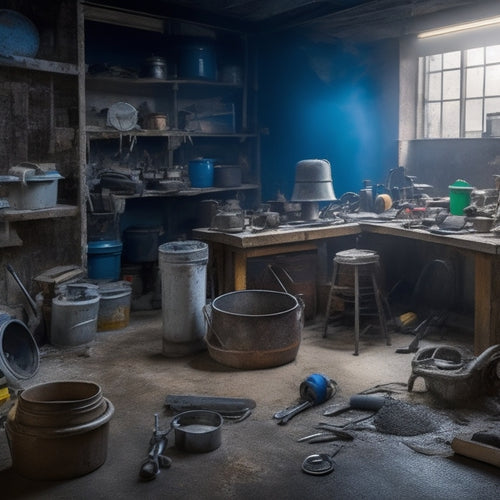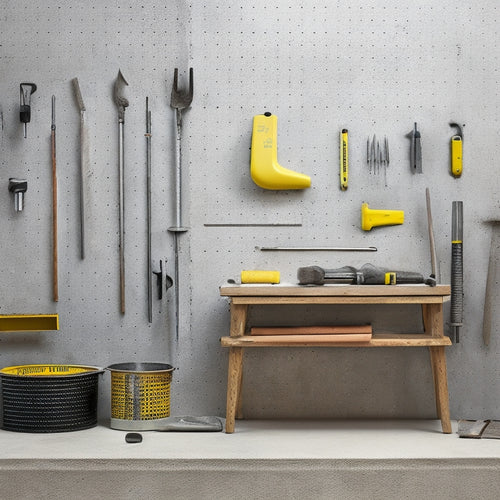
What Tools Do I Need to Split Concrete Blocks
Share
You'll need a reliable concrete block splitter, whether manual or hydraulic-powered, to efficiently split concrete blocks into manageable pieces. Consider brands like Iowa Manufacturing, Mantis, and Split-Star, and prioritize splitter maintenance with easy-to-clean components, lubrication points, and adjustable blades. Evaluate the splitter's capacity, power source, and portability based on your project requirements. Whether buying new or used, inspect the tool for signs of wear, rust, or corrosion, and check the seller's ratings and feedback. Now that you've got the basics covered, investigate the world of used tools and uncover how to get the best value for your investment.
Key Takeaways
- Cinder block splitters, available in manual and hydraulic-powered models, are essential for splitting concrete blocks efficiently and safely.
- Consider the capacity, power source, and portability of the splitter based on project requirements and the type of blocks being split.
- Prioritize splitter maintenance with easy-to-clean components, lubrication points, and adjustable blades to ensure optimal performance.
- Inspect used tools thoroughly for signs of wear, rust, or corrosion before purchasing, and evaluate the seller's reputation and feedback ratings.
- Safety gear, including gloves, goggles, and steel-toed boots, is crucial when operating concrete block splitters to prevent accidents and injuries.
Online Marketplaces for Used Tools
How can you find reliable online marketplaces to purchase used tools for splitting concrete blocks? Start by researching well-established online tool marketplaces that specialize in used tool auctions.
Look for platforms with a strong reputation, verified seller profiles, and a secure payment system. Websites like eBay, Craigslist, and Facebook Marketplace often have a wide variety of used tools available.
You can also investigate specialized online marketplaces like ToolBarn, ToolTrader, and ConstructionEquipmentGuide, which cater specifically to the construction industry.
When browsing these platforms, pay attention to the seller's ratings, reviews, and feedback. Be cautious of extremely low prices, as they may indicate a scam or low-quality tool.
Inspect the tool's condition, warranty, and return policy before making a purchase. Additionally, consider the shipping costs, as they can greatly add to the overall price.
Popular Used Cinder Block Splitters
When searching for reliable used tools to split concrete blocks, you'll likely come across various cinder block splitters that have proven themselves in the field. These splitters are designed to handle different cinder block types, including standard, half-high, and jumbo blocks.
You'll find popular used cinder block splitters from brands like Iowa Manufacturing, Mantis, and Split-Star. These brands offer a range of models, from manual to hydraulic-powered splitters, each with its own strengths and weaknesses.
When selecting a used cinder block splitter, prioritize splitter maintenance. Look for models with easy-to-clean components, lubrication points, and adjustable blades. Regular maintenance is essential to extend the splitter's lifespan and guarantee consistent performance.
Additionally, consider the splitter's capacity, power source, and portability. Will you be working on a small or large-scale project? Do you need a splitter that can handle heavy-duty use or occasional tasks?
Buying From Individual Sellers Safely
When buying a used concrete block splitter from an individual seller, you'll want to research the seller's reputation and feedback ratings to guarantee you're dealing with a trustworthy person.
Check if the seller has a history of successful transactions and if previous buyers have reported any issues.
Additionally, make certain to use a secure payment method that offers protection, such as a credit card or online payment services with built-in safeguards.
Research the Seller
Most individual sellers listing concrete block splitting tools online are legitimate, but it's crucial to research them thoroughly to avoid scams and guarantee a smooth transaction.
When buying from individual sellers, you need to be cautious and do your due diligence. Start by checking the seller's reputation online. Look for customer reviews on their social media profiles, online marketplaces, or forums. Pay attention to the overall rating and read the comments to get an idea of their customer service, product quality, and reliability.
You can also search for the seller's name or business name on search engines to see if there are any red flags or negative reviews. Check if they've a physical address and contact information listed. A legitimate seller should be transparent about their business and provide a way to contact them.
Be wary of sellers with low ratings, few reviews, or those who are evasive about their business information. By doing your research, you can greatly reduce the risk of falling prey to scams and guarantee a safe and successful transaction.
Check Payment Security
Verify the payment method before handing over your hard-earned cash to an individual seller.
When buying from an individual, you want to ascertain that your transaction is secure and protected. You're not just buying a tool to split concrete blocks, you're also entrusting your payment information to the seller.
To guarantee secure transactions, look for payment methods that offer buyer protection.
Here are some options to take into account:
-
Escrow services: These services hold the payment until you've received the tool and verified its condition.
-
Credit card payments: Many credit cards offer fraud protection and allow you to dispute charges if the tool doesn't arrive or isn't as described.
-
Online payment platforms with buyer protection: Platforms like PayPal or Google Pay often have built-in buyer protection policies that can help resolve disputes.
Inspecting Used Tools for Damage
How thoroughly have you examined your used tools before putting them to work on splitting concrete blocks? It's essential to inspect your tools for damage to guarantee they're functional and safe to use. Neglecting tool maintenance can lead to accidents, poor performance, or even complete tool failure.
When evaluating damage, start by visually inspecting the tool's exterior for signs of wear, rust, or corrosion. Check for loose or damaged handles, as these can compromise your grip and control.
Next, examine the tool's cutting edges or points for dullness, chipping, or cracking. Make certain all moving parts are well-lubricated and functioning smoothly.
Perform a damage evaluation by testing the tool's performance on a small, inconspicuous area of the concrete block. If the tool struggles to make a clean cut or shows signs of strain, it's likely damaged and needs repair or replacement.
Regular tool maintenance and damage evaluation can extend the life of your tools and guarantee a successful concrete block-splitting project.
Refurbished Vs Used Cinder Block Tools
When considering refurbished vs used cinder block tools, you'll find that refurbished options often come with benefits like warranties, recalibrated components, and thorough cleaning.
In contrast, used tools may have hidden flaws, worn-out parts, and unknown maintenance histories that can lead to costly repairs or even safety hazards.
Refurbished Options Benefits
Frequently, contractors and builders opt for refurbished tools to split concrete blocks, and for good reason. You can enjoy refurbished advantages while splitting concrete blocks, including considerable cost savings.
Refurbished tools are rebuilt to original equipment manufacturer (OEM) specifications, guaranteeing they meet quality and performance standards.
Some benefits of refurbished tools include:
-
Warranty coverage: Many refurbished tools come with a warranty, providing you with protection against defects and malfunctions.
-
Like-new condition: Refurbished tools are thoroughly inspected and repaired to ascertain they're in like-new condition, offering reliable performance.
-
Substantial cost savings: Refurbished tools can be considerably cheaper than buying new, allowing you to allocate budget to other project expenses.
Used Tools Drawbacks
Most construction projects involve splitting concrete blocks, and you may be considering used tools as a cost-effective alternative. While used tools may seem like a budget-friendly option, they often come with hidden drawbacks that can end up costing you more in the long run.
One major concern is the unknown history of the tool. You may not know how well the previous owner maintained the tool, which can lead to unexpected breakdowns or performance issues. This can cause delays and additional expenses to repair or replace the tool.
Additionally, used tools may not come with warranties or manufacturer support, leaving you to foot the bill for any repairs.
When considering used tools, it's important to factor in cost considerations beyond the initial purchase price. You'll need to budget for potential maintenance and repairs, which can add up quickly.
To minimize these risks, it's vital to follow strict maintenance tips, such as regularly inspecting and cleaning the tool, as well as storing it properly when not in use.
However, even with proper care, used tools may still not perform as well as new or refurbished options, which can impact the quality of your work.
Benefits of Buying Used Online
You can considerably reduce your expenses by buying used concrete block splitting tools online. This option offers several benefits, making it an attractive choice for those on a budget.
Buying used online provides significant cost savings. You can acquire the tools you need at a fraction of the original price, allowing you to allocate resources to other aspects of your project.
Additionally, purchasing used tools reduces the environmental impact of manufacturing new ones, which requires extracting and processing raw materials.
Some of the key advantages of buying used concrete block splitting tools online include:
- Lower upfront costs, which can be invested in other areas of your project
- Reduced environmental impact, as you're reusing existing tools rather than contributing to the demand for new ones
- Wider selection, as you're not limited to what's available in local stores
Common Issues With Used Splitters
When acquiring used concrete block splitting tools online, it's important to be aware of the potential pitfalls that can arise from purchasing pre-owned equipment. You may encounter issues with worn or damaged components, which can lead to reduced performance, safety hazards, or even complete tool failure.
Be cautious of sellers who fail to disclose the tool's maintenance history, as this can hide underlying problems.
To mitigate these risks, it's vital to inspect the tool thoroughly before purchasing. Look for signs of wear on moving parts, hydraulic systems, and blades.
Check the tool's overall condition, and review the seller's ratings and feedback. Additionally, research maintenance tips and common repairs for the specific tool you're interested in, so you're prepared to address any potential issues that may arise.
Tool Condition and Pricing Guide
Because the condition of a used concrete block splitter greatly impacts its performance and safety, it's vital to evaluate the tool's state before making a purchase.
A well-maintained tool can provide years of reliable service, while a neglected one can lead to accidents and subpar results.
When inspecting a used splitter, look for signs of wear on the hydraulic system, blade, and other moving parts.
Check for any rust, corrosion, or damage that could compromise the tool's integrity.
Additionally, consider the following factors when evaluating the tool's condition:
- Hydraulic fluid levels and condition: Confirm the fluid is at the recommended level and free from contaminants.
- Blade sharpness and condition: A dull or damaged blade can increase the risk of accidents and reduce the tool's effectiveness.
- Electrical system integrity: Verify that all electrical components, including cords and switches, are in good working order.
Warranty and Return Policy Check
A concrete block splitter's warranty and return policy serve as a safeguard against defects, malfunctions, and buyer's remorse. When purchasing a tool, you should carefully review the warranty details to understand what's covered and for how long. Typically, warranties range from 30 days to several years, depending on the manufacturer and product.
Before making a purchase, you should also familiarize yourself with the return process. Know what's required to initiate a return, such as a receipt or proof of purchase, and the timeframe in which you can return the tool. Some manufacturers may have restocking fees or specific procedures for returning defective or damaged items.
It's crucial to check the warranty and return policy before finalizing your purchase. This guarantees you're protected in case the tool doesn't meet your expectations or fails to perform as advertised.
Safety Precautions for Used Tools
When using tools to split concrete blocks, you must prioritize your safety above all else.
You'll need to wear protective gear, including gloves, safety glasses, and a dust mask, to shield yourself from flying debris and harmful particles.
Additionally, you should always check the condition of your tools before use and handle them with caution to prevent accidents.
Wear Protective Gear
One vital step in preparing to split concrete blocks is to wear protective gear. You'll be working with heavy, dense materials and powerful tools, so it's important to protect yourself from potential hazards.
Wearing the right gear will prevent injuries and guarantee you can work safely and efficiently. Here are the essential items to include:
-
Protective gloves: These will shield your hands from cuts, abrasions, and impact. Look for gloves with grip and flexibility to maintain dexterity while handling tools and blocks.
-
Safety goggles: Concrete splitting can create flying debris, so safety goggles will protect your eyes from potential damage. Choose goggles with anti-fog coating and good peripheral vision.
-
Steel-toed boots: These will protect your feet from heavy blocks and tools. Make sure they're comfortable and provide sufficient support for your ankles.
Check Tool Condition
Before splitting concrete blocks, inspect your tools to verify they're in good working condition. This vital step guarantees your tool maintenance is up to par, preventing accidents and subpar performance.
Evaluate each tool's performance by checking for signs of wear, damage, or corrosion. Look for loose handles, dull blades, or faulty mechanisms that may affect the tool's overall performance.
Conduct a thorough performance evaluation to identify any issues that need attention. Check the tool's safety features, such as guards or protective shields, to verify they're functioning correctly.
Inspect the tool's moving parts, like gears or chains, to verify they're well-lubricated and free from obstruction.
Handle With Caution
Take hold of used tools with caution, as they can harbor hidden dangers. You may not be aware of the previous owner's safety habits or tool maintenance routines. It's vital to exercise caution when handling used tools to avoid accidents and injuries.
Before using a used tool, inspect it thoroughly for signs of wear and tear, damage, or malfunction. Look for:
-
Rusty or corroded components: Check for signs of rust or corrosion on metal parts, which can weaken the tool's structure and lead to failure.
-
Damaged or frayed cords: Inspect electrical cords for signs of damage, fraying, or exposed wires, which can cause electrical shock.
-
Loose or missing parts: Verify that all parts are securely attached and functioning correctly, as loose or missing parts can cause the tool to malfunction.
Additionally, consider investing in safety training to learn proper tool handling and operation techniques.
Regular tool maintenance is also vital to guarantee your tools remain in good working condition and reduce the risk of accidents.
Frequently Asked Questions
Can I Rent Concrete Block Splitting Tools Instead of Buying?
You can rent concrete block splitting tools, which might be a cost-effective option, especially for one-time or infrequent use, as it eliminates the upfront purchase cost, and you'll benefit from rental benefits like minimal storage and maintenance responsibilities.
Are Electric or Hydraulic Splitters More Suitable for Beginners?
When choosing between electric and hydraulic splitters, you'll find electric splitters offer quieter operation, lower maintenance, and cost-effectiveness, while hydraulic splitters have higher force output but are heavier, noisier, and require more upkeep.
How Do I Store and Maintain My Concrete Block Splitter?
You'll guarantee your concrete block splitter lasts by storing it in a dry, clean area, away from direct sunlight, and performing regular maintenance, including lubricating moving parts and checking hydraulic fluid levels to prevent corrosion.
Can I Use a Concrete Block Splitter for Other Demolition Tasks?
You can repurpose your concrete block splitter for alternative demolition techniques, but prioritize splitter safety precautions, ensuring proper guarding and operator training to avoid accidents and maximize efficiency in various demolition tasks.
Are There Any Eco-Friendly Concrete Block Splitting Tool Options?
You'll find eco-friendly concrete block splitting tool options that incorporate sustainable materials and green technology, such as hydraulic splitters with recyclable components or electric models with energy-efficient motors, offering a more environmentally responsible way to split concrete blocks.
Conclusion
You've finally found the perfect used cinder block splitter, but don't celebrate just yet. Remember, a used tool is only as good as its previous owner's care, and you're about to inherit all its hidden flaws. So, before you start splitting concrete blocks like a pro, take a step back, inspect your new tool carefully, and hope that it doesn't split under the pressure – literally.
Related Posts
-

7 Tools to Fix Damaged Concrete Floors
You're about to tackle that damaged concrete floor, and the right tools are essential for a successful repair. Start ...
-

10 Must-Have Tools for Concrete Repair Organization
You'll need a solid organization system to keep your concrete repair tools and materials within easy reach, protected...
-

Free Design Tools for Concrete House Planning
You can kick-start your concrete house planning project without breaking the bank, as there are several free design t...


